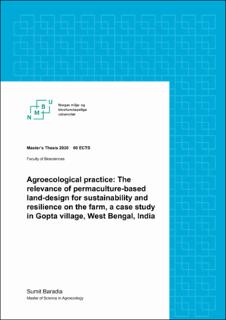| dc.contributor.advisor | Nicolaysen, Anna Marie | |
| dc.contributor.advisor | Lieblein, Geir | |
| dc.contributor.author | Baradia, Sumit | |
| dc.coverage.spatial | India, West Bengal, Gopta | en_US |
| dc.date.accessioned | 2021-05-30T11:18:43Z | |
| dc.date.available | 2021-05-30T11:18:43Z | |
| dc.date.issued | 2021 | |
| dc.identifier.uri | https://hdl.handle.net/11250/2756943 | |
| dc.description.abstract | Intensive agriculture does not only adversely affect farmland biodiversity but also causes rapid environmental degradation. Harmful chemicals involved in such high-yielding industrial agriculture have led to consumers’ and the growers’ poor health. Excessive dependency on machines has weakened the socio-cultural bond within the communities. Permaculture as an alternative farming system is based on ecological principles and hence may be more sustainable. Its design principles and value-based ethics utilise all available resources at the farm in an optimised manner without imposing any burden on the environment. In this explorative case study of Vasudev farm in Gopta Village in West Bengal, India, I investigated the effect of permaculture-based land design (PLD) on the given farming system’s sustainability and resilience. I also questioned the PLD strategies being used and the future of such practices. This participatory action research (PAR) included transect walks, participatory observations, semi-structured interviews, and a visioning workshop. My research questions looked at the PLD’s relevance in the given farm for its sustainability and resilience. My inquiry leads to the identification of three integrals to be relevant at the given farming system: 1) implementing a holistic approach, 2) developing an in-depth understanding for maximum usage of the multifunctional farm structures and resources, and 3) working on conservation and adaptation strategies by creating an ecological web and crucial interlinking factors of the farming system. The research findings suggest that the present Vasudev farming system’s sustainability and resilience have improved during the last five years and is also prepared to grow amidst future challenges and aspirations. | en_US |
| dc.language.iso | eng | en_US |
| dc.publisher | Norwegian University of Life Sciences, Ås | en_US |
| dc.rights | Attribution-NonCommercial-NoDerivatives 4.0 Internasjonal | * |
| dc.rights.uri | http://creativecommons.org/licenses/by-nc-nd/4.0/deed.no | * |
| dc.title | Agroecological practice : the relevance of permaculture-based land-design for sustainability and resilience on the farm : a case study in Gopta village, West Bengal, India | en_US |
| dc.type | Master thesis | en_US |
| dc.description.localcode | M-AE | en_US |

